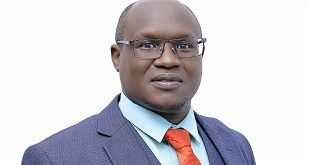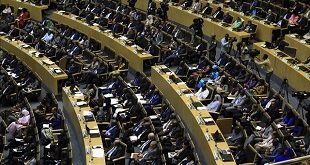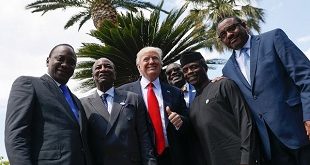
By Haggai Matsiko
July was bound to be a hot month in Uganda, politically speaking as most of the major opposition groups have announced they will be electing their flag-bearers for the 2016 elections. But few anticipated the events of the last week of June. In a sign of the speed at which events are shifting, Besigye who was abroad in the last week of June, wrote an email to the FDC’s Electoral Commission indicating that he wants to be the party’s flag-bearer in the 2016 national presidential election. Party spokesperson, Ssemujju Nganda told The Independent that Besigye instructed Godfrey Ekanya and Ingrid Turinawe to pick nomination forms on his behalf.
Within FDC, that set Besigye up to battle it out with the party President, retired Maj. Gen. Mugisha Muntu who also picked nomination forms.

Somewhere in the mix is The Democratic Alliance (TDA), the newly established group pushing for a joint opposition candidate to contest against President Yoweri Museveni at the 2016 polls. FDC, Democratic Party (DP), Uganda Federal Alliance (UFA), UPC, the Peoples Progressive Party (PPP), Justice Forum, Conservative Party (CP) and Pressure for National Unity leaders have all signed a protocol as members of TDA. But none of their most visible members are in charge at TDA. Instead, Godber Tumushabe, the suave civil society operator formerly heading ACODE, the governance NGO, is the Technical Coordinator of TDA. The other point one notices immediately is that TDA is led by individuals who have previously had only peripheral roles in the opposition. Now most of them head powerful committees.
The new FDC chairman Wasswa Biriggwa, is head of Finance and Fundraising, DP Vice President John Kawanga, is head legal affairs, and former Buganda kingdom premier, Joseph Mulwanyammuli is head of the Disputes Resolution Committee. Most of these can barely be recognised on the street. Then there are others like Leader of Opposition, Wafula Oguttu the head of the Publicity Committee, and Justice Forum president Asuman Basalirwa, who heads the Campaign Strategy and Coordination Committee.
The NGO feel around the TDA is completed by its `Summit of Principals”; a collections of opposition leaning eminent persons including Bishop Zac Niringiye, Makerere University professor Abas Kiyimba, Fr. Gaetano Batanyenda, Bishop McLeod Baker Ochola, and renowned constitutional lawyer, Prof. Fredrick Ssempebwa. Known faces among the principals include FDC leaders Kizza Besigye and Augustine Ruzindana, and renowned activist Miria Matembe. So how will the real leaders of the opposition fit into the TDA?
Alliance shunned
Observers point out that TDA can only be effective if it can get all the opposition on board. For now, it is yet to get some political parties and political pressure groups to sign on.
For now, however, it appears the parties are focusing inwards. Within FDC, it remains unclear how either Besigye or Muntu will react when defeated? Will, especially Besigye, sit back and back Muntu? Will the winner offer themselves to contest to be the leader of The Democratic Alliance (TDA)? Will they accept the chosen joint candidate of the TDA – even if it’s former prime minister Amama Mbabazi?
The Uganda People’s Congress (UPC) on June 24 revealed that it is not yet sure whether it will participate in TDA.
Olara Otunnu, the UPC president, explained that he has not signed TDA’s protocol because he was not mandated by the National Council and Delegate’s Conference of his party.
The party’s decision to sign the protocol can only be reached after consultation from organs of the national council and the delegate’s conference.
UPC is set to hold its delegate’s conference to among others, endorse new controversial president Jimmy Akena on July 10.
When asked about concerns that the TDA is engaging with parties that are still struggling to resolve internal issues and jostling over who will lead the TDA, Tumushabe attempted to dismiss the whole debate about who becomes the platform’s joint candidate as a creation of the media.
“To tell you the truth,” he told The Independent, “we are not yet there.”
He said that he did not think anyone of the alliance members was even remotely worried about who will be selected as a joint candidate or that the debate was taking place.
“This is because we are taking time, putting in place rules and criteria to be followed in the selection process and whoever is to become the TDA candidate must be subjected to the same criteria,” Tumushabe explained.
He said their view is that those who are pre-occupied with that debate are putting the horse before the cart.
He explained that TDA will be different in a sense that it will be reversing a trend where it is individuals that sponsor platforms. “With TDA,” Tumushabe said, “it will be the alliance sponsoring candidates.”
“We are used to politics of individuals and not ideas,” Tumushabe added, “but we intend to invest a lot of time selling TDA as an idea, a platform that is an alternative for credible leadership.”
Tumushabe told The Independent that TDA is like a moving vehicle and “those interested are free to sign onto the alliance along the way at the point they feel ready,” he said. It was an inapt metaphor as the dangers of jumping on a moving vehicle are clear.
But Mathias Mpuuga, the Masaka Municipality legislator, who has experience organising such joint platforms told The Independent that because Uganda’s politics has tended to centre on individuals charisma and ingenuity, the debate about individuals cannot be avoided.
Mpuuga led the opposition pressure group—Ssubbi—which was part of the failed IPC of 2011. He said this time will be different.
“We have reached a point where any change works,” he said.
According to him, the issue of who becomes what in the alliance is always going to be a challenge.
“What matters is that at the end of the day, members are able to move beyond it and pursue the change everyone is yearning for.”
Another major worry for the TDA should be what is happening within some of Uganda’s major opposition groups whose leaders seem disinterested or detached.
Mpuuga, for instance, has not been as active as he was when Ssubbi was at the forefront for change. Other known opposition leaders like Kampala Lord Mayor, Erias Lukwago, and former Leader of Opposition in parliament, Nandala Mafabi, and even Besigye have not featured prominently at the forefront of TDA activities.
Mpuuga says since 2014, some of those leaders who are considered `radical activists’ have chosen to surrender the frontline to moderates.
“We were accused by among others some sections of the opposition of being radicals,” Mpuuga explained, “they were of the view that we were scaring away the moderates, the middle class and we felt that it would be good to give a chance to another approach.”
So to answer your question, Mpuuga added; “it is not that we are detached, we just surrendered the frontline to that other approach by moderates.”
Who will be TDA choice?
But behind such posturing, although a lot of attention has been on Mbabazi, it has riveted to the defacto leader of the opposition, Dr. Besigye, since he picked nomination forms.
Mbabazi is already marketing himself as that leader with capabilities to lead the transition from the President Museveni’s generation, which came to power in 1986 after a protracted 5-year guerrilla war.
When TDA was launching, Mbabazi did not appear but his sister-in-law, Hope Mwesigye, who attended claimed she was representing the pro-Mbabazi camp.
Besigye attended but indirectly expressed concerns that the outfit seemed fixated on participating in elections instead of pushing for the electoral reforms.
There are reports that Besigye and Mbabazi held talks including in London, where the two men were towards the end of June. The subject of their talks, however, remains unknown.
Whatever it is, none of the two men’s allies expects that either can agree to a deal in which the other becomes the platform’s flag-bearer.
Besigye’s supporters are already pushing him to contest and Mbabazi has also already made it clear he will be seeking to contest for the Presidency of Uganda—his online activity has given him an edge as he remains the most trending subject.
His only huddle remains how to deal with the NRM and how to approach TDA in case he is blocked from contesting with in the NRM—a venture the party leadership is already pursuing.
Apart from Besigye and Mbabazi, former Vice President Gilbert Bukenya also seems deeply interested. Apart from hosting some of TDA’s activities at his hotel—Katomi Kingdom Resort—insiders say he is keen on selling himself as the most suitable candidate of the platform given that he is a Muganda and a catholic. Catholics and Baganda are the majority religious and ethnic groups respectively.
On that list add Mugisha Muntu, the current FDC President, who is also seeking to be the party’s flag-bearer.
Even if these contenders are not sponsored by their parties, the alliance allows them to front themselves as citizen contenders.
Moses Byamugisha, an FDC activist who recently pulled out of the race for FDC presidential flag-bearer told The Independent that the choice between Besigye, Muntu, and Mbabazi is clear.
“It is a leadership crisis that makes Ugandans want Besigye to contest again,” Byamugisha said, “because when they look around they do not see a leader like Besigye. It is going to take Uganda along time to get a leader like him.”
“Mbabazi is instrumental to the opposition in as far as dismantling the dictatorship is concerned,” he said, “but that role should not be confused with a leadership role in the post-Museveni era. Those are two different roles and people should not confuse them.”
Byamugisha, therefore, said that TDA must find ways of creating an environment where Mbabazi can operate, create a break away from the NRM, weaken Museveni and eventually dismantle his dictatorship but make sure he does not become the post-Museveni leader.
He explained that the reason Mbabazi cannot be that transitional leader is because he cannot provide that credible alternative leadership “for reasons Ugandans are well aware of from Mbabazi’s time as Prime Minister”.
“We have been working with Mbabazi’s youths, advising them tactically on how to engage the dictatorship not because we support Mbabazi,” Byamugisha said, “we have been doing it because we welcome any Ugandan in the struggle for change.”
The youthful activist told The Independent that he was now engaged in inspiring and encouraging youth to take leadership in the opposition because what Uganda needs is generational transition.
But the confusion over who to lead with as the Presidential flag-bearer might be the biggest undoing for TDA.
TDA’s strategy
On June 25, the TDA opened up the process of choosing its joint candidates for the presidential, parliamentary and local government elections—following a decision a day before at the second meeting of its Summit, which is its highest policy and decision-making organ.
Bishop Zac Niringiye has told The Independent that one of the biggest traits the TDA expects from the leader of the Alliance is that he/she will be a transitional leader that must lead for only one term and handover power.
Potential candidates are expected to emerge from political parties and individual citizens. Members of political parties, the outfit announced, must be presented following selection processes in accordance with their internal party processes.
“The TDA further informs its members and all Ugandans that the final decision on who will be the joint candidates of The Alliance right from LCI to president will only be made by the Summit upon recommendation of the National Candidates Committee established in accordance with Article VIII of the TDA protocol,” the outfit noted in a June 25 presser.
On the other hand, all individual citizens are required to do is pledge to be bound by the TDA protocol and support for the citizens reform proposals set out in the citizens compact on free and fair elections.
While the platform is going ahead with its programmes, however, some have already started expressing concerns over different issues. For some, if not resolved these concerns, might be the sharp jaws that could render the outfit ineffective just like happened to the Inter-party Coalition (IPC) in the run up to the 2011 elections. The IPC failed to field a joint opposition candidate against President Museveni.
As happened back then, even as the process of establishing organisational structures is going on, some are already pre-occupied with the choice of the presidential flag-bearer.
The TDA expects internal party processes and consultations by potential citizen contenders to go on for two months but not later than August 31 when the TDA National Candidates Committee and the Summit will make the final decision on joint candidates’ selection.
 The Independent Uganda: You get the Truth we Pay the Price
The Independent Uganda: You get the Truth we Pay the Price


